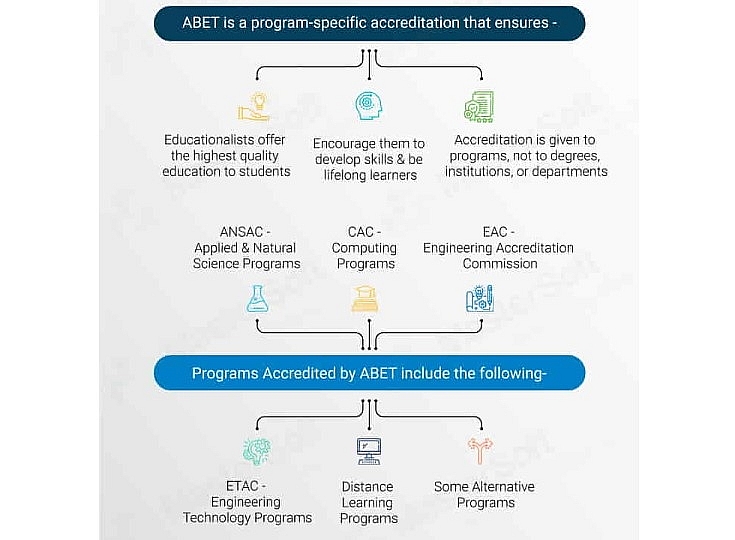What Is ABET Accreditation: Programs, Requirements and Fees (Inside/Outside The US)
What is ABET Accreditation?
Similar to other forms of accreditation, ABET serves to ensure that educational institutions meet all necessary standards for delivering quality education to students and fostering a commitment to lifelong learning. However, it offers accreditation to various programs, rather than to degrees, institutions, or any departments.
ABET accreditation emphasizes the development of graduates equipped with essential skills, academic knowledge, and core values. According to the statistics, ABET has accredited over 4,300 programs across 41 countries.
ABET accreditation serves as a guarantee that a college or university program aligns with the quality standards set forth by the relevant profession for which it prepares its students. An accredited engineering program is required to adhere to the quality standards established by the engineering profession. A computer science program that is accredited is required to adhere to the quality standards established by the computing profession.
 |
| What Is ABET Accreditation? Photo: knowinsiders.com |
What does ABET stand for?The Accreditation Board for Engineering and Technology (ABET) is known as ABET. It was reported by spie.org that ABET is the official accrediting body for engineering, computing, engineering technology, and applied science associates, bachelors, and masters degree programs at colleges and universities. It is an independent, non-profit group that is approved by the Council for Higher Education Accreditation (CHEA). |
Accreditation Commissions
The ABET Accreditation process is carried out by our four accreditation commissions. Each commission sets accreditation standards for specific program areas and degree levels.
1. Applied and Natural Science Accreditation Commission (ANSAC)
Programs: Applied and Natural Science
Levels: Associate, Bachelor, Master
2. Computing Accreditation Commission (CAC)
Programs: Computing
Level: Bachelor
3. Engineering Accreditation Commission (EAC)
Programs: Engineering
Levels: Bachelor, Master
4. Engineering Technology Accreditation Commission (ETAC)
Programs: Engineering Technology
Levels: Associate, Bachelor
What are the Programs Accredited by ABET?
ABET approves degree-granting programs at colleges and universities outside of the United States that are nationally accredited or regionally accredited in the United States. As abet.org said, it does not accredit programs for certification, training, or doctoral degrees.
-ANSAC - Applied & Natural Science Programs: ANSAC accredits applied and natural science programs at the following levels: associate (two-year degree), bachelor (four-year degree), and master (post-graduate).
-CAC - Computing Programs: CAC accredits computing programs at the following level: bachelor (four-year degree).
-EAC - Engineering Accreditation Commission: EAC accredits engineering programs at the following levels: bachelor (four-year degree) and master (post-graduate).
-ETAC - Engineering Technology Programs: ETAC accredits engineering technology programs at the following levels: associate (two-year degree) and bachelor (four-year degree).
-Distance Learning & Alternative Programs: While the majority of ABET-accredited programs are primarily offered on-site, a small number of them are available in an online format.
For example, individual classes, homework, and class research projects are all available online for many academic programs at the college level. It's not always clear what a "online" program really is. Also, the amount of online content in any given academic program changes all the time.
The vast majority of ABET-approved programs are mostly held on-site. Here are some ABET-approved programs that can be taken entirely online. This list is updated once a year, in October.
Online Programs Accredited by ABET
Arizona State University: Electrical Engineering (BSE); Engineering Management (BSE); Information Technology (BS); Software Engineering (BS)
Capella University: Information Technology (BS); Daytona State College; Engineering Technology (BS)
Devry University: Engineering Technology-Electronics (BS); Engineering Technology-Computers (BS)
East Carolina University: Occupational Safety (MS)
Eastern Kentucky University: Fire Protection and Safety Engineering Technology (BS)
Excelsior College: Electrical Engineering Technology (BS); Information Technology (BS); Nuclear Engineering Technology (BS)
Grantham University: Electronics Engineering Technology (BS)
Kennesaw State University: Information Technology (BS); Information Technology (BASIT)
Middle Georgia State University: Information Technology (Macon and Warner Robins) (BS)
National University: Computer Science (BSC)
Oakland University: Safety Management (MSSM): Environmental Health and Safety (BS)
Regis University: Computer Information Systems (BS): Computer Networking (BS); Computer Science (CPS) (BS); Information Technology (BS)
Stony Brook University: Electrical Engineering (BS)
The Johns Hopkins University: Systems Engineering (MSE)
Thomas Edison State University: Nuclear Energy Engineering Technology (BS); Electronics Systems Engineering Technology (BSAST)
Trinidad State Junior College: Occupational Safety and Health Technology (AAS)
University of Central Missouri; Occupational Safety Management (MS)
University of Southern Mississippi: Construction Engineering Technology (BS); Electronic(s) Engineering Technology (BS); Industrial Engineering Technology (BS)
Walden University: Information Technology (BS)
| The ABET-accredited program must have: -Long Term Objectives- Educational objectives set for the long term based on the standards set by alumni batch students and the constituency requirements. -Measurable Goals - The student outcomes must be mapped throughout the graduation & need to be determined in advance. In simple words, the goals must be measurable. -Sustainable Process - The evaluation & assessment process must be sustainable. |
*****
Why Is ABET Accreditation Important?
For students
Getting a degree requires a significant financial investment and a significant time commitment. If you want to get a degree in engineering or technology, valuecolleges.com says you should only enrol at schools that have been recognized by an engineering accreditation agency.
Earning a degree that has been accredited ensures that it is up to par with the professional standards of your chosen field. Verifying your eligibility for national licensure and certification is another benefit of accreditation. Accreditation by the Accreditation Board for Higher Education (ABET) is a prerequisite for licensure or certification, as is registration. There is a direct correlation between accreditation and an increase in international job opportunities.
For institutions
In the US, ABET certification is not mandatory. Several factors influence a school's decision to undergo the rigorous accreditation process. The rigorous accreditation process guarantees that your engineering program offers students the best education possible and provides insights and a mountain of data.
Professionals in your field will see that your academic programs are up to par with the best when you have ABET accreditation. The fact that your graduates have proven themselves capable of not only meeting but also surpassing the expectations of prospective employers is evidence of this.
 |
| ABET Accreditation finished the assessment process of the accreditation of the Computer Systems Engineering program that lasted for four days through Zoom. Photo:aaup.edu. |
When a school gets ABET accreditation, it means that it has used the best teaching methods and that it is known around the world for its successes and high standards. The fact that they are always evaluating their own quality standards shows that the faculty and staff are working hard to raise the standards of education. What the results show is more important than what the teachers say about the quality of education at the school.
For global standards
ABET accreditation guarantees that the most stringent quality standards are implemented globally. This leads to a workforce that is globally mobile, innovative, and highly diverse in terms of technological advancement, as well as educated to a higher standard. In industries that necessitate a high degree of precision and organization, students are expected to adhere to a professional standard. Additionally, students are provided with the necessary tools and resources to ensure their mobility on a national and global scale.
Programs are assessed to ascertain the quality and value of the content, as well as the relevance of the anticipated outcomes, through the utilization of third-party peer review systems. The procedure that is now utilized by professionals from nearly every sector was developed over the course of more than 80 years. Accreditation provides students with opportunities for continued advancement in industrial settings, which are based on the exceptional education they have received.
Who Sets the ABET Quality Standards?The ABET professions establish the quality standards that programs must adhere to in order to be accredited. This is facilitated by the collaborative endeavors of numerous professional and technical societies. The standards are developed by these societies and their members in collaboration with ABET, which also provides the professionals responsible for evaluating the programs to ensure that they meet the established standards. |
*****
Program Eligibility Requirements
1. Meet ABET’S Definition of a Program:
It only approves programs—not degrees, departments, colleges, institutions, people, or things. This article says that a program is a planned, unified experience that ends with a degree. The criteria for accreditation say that the program must have educational goals, student outcomes, a curriculum, faculty, and facilities. It doesn't approve of programs that lead to certification, training, or a doctoral degree.
2. Be Housed in a Degree-Granting Institution:
It accepts Requests for Evaluation (RFE) from post-secondary programs that are offered by degree-granting institutions with verifiable and recognized governmental, national, or regional authority to confer degrees. In certain instances, an institution that does not satisfy this requirement may request an evaluation of a program if the accreditation of the program enables ABET to fulfill its mission.
3. Have at Least One Graduate:
Programs requesting an initial accreditation review must have at least one graduate prior to the academic year when the on-site review occurs.
4. Name Must Meet ABET Requirements:
The name of a program that is seeking accreditation must be descriptive of the program's content and must be precisely the same on the graduate's transcript and in the institution's literature.
The program's name must be provided in both English and the native language(s) for programs located outside the United States, where English is not the native language. The same program name may not be used by an institution to distinguish between a program that is ABET-accredited and a program that is not.
5. Be Accreditable Under at Least One ABET Accreditation Commission:
Each program seeking accreditation will be assigned to a specific commission or commissions based upon the literal name of the program:
Applied and Natural Science Accreditation Commission (ANSAC)
Programs accredited by ANSAC are those leading to professional practice utilizing science, mathematics, and engineering concepts as a foundation for discipline-specific practice. ANSAC accredits programs at the following degree levels: associate, bachelor, and master.
Computing Accreditation Commission (CAC)
Programs accredited by CAC are those leading to professional practice across the broad spectrum of computing, computational, information, and informatics disciplines. CAC accredits programs at the following degree level: bachelor.
Engineering Accreditation Commission (EAC)
Programs accredited by EAC are those leading to the professional practice of engineering. All engineering programs requesting ABET review must include the word “engineering” in the program name. EAC accredits programs at the following degree levels: bachelor and master.
Engineering Technology Accreditation Commission (ETAC)
Baccalaureate degree graduates are prepared for careers in sectors such as construction, manufacturing, product design, testing, or technical services and sales through programs accredited by ETAC. Engineering technician positions in maintenance, production, or product development are probable for graduates of two-year engineering technology programs. The term "technology" must be included immediately following the word "engineering" in the name of every ETAC-accredited program. The following degree levels are accredited by ETAC: associate and bachelor.
6. Some Programs Must Undergo a Readiness Review:
A preliminary Self-Study Report is required from all programs pursuing initial accreditation when the institution lacks any currently ABET-accredited programs within that commission. Following an assessment of the preliminary Self-Study Report, referred to as the Readiness Review, we will ascertain the institution's preparedness to submit a formal Request for Evaluation (RFE) for the program.
 |
| Photo: iitms.co.in. |
The 18 months of ABET is divided into the following stepsStage 1: Readiness Review - October 1 To complete the readiness review, institutions need to collect samples of assignments, syllabus, curriculum and get ready by October 1. Stage 2: Evaluation Request By January 31 RFE needs to be submitted by January 31. A review team is assigned by the month of April and May depending on the review. Stage 3: Submit SSR Report By July 1 The review of SSR begins by the month of July. Stage 4: Onsite Visit By September-December An onsite visit can be arranged between September-December. Institutions need to be well prepared with documents & faculty will need to face interviews of the panel. Stage 5: Decision-Making Process Any corrections in the documents are asked within 1 week Formal communication about findings is done in 2-3 months after the onsite visit Institutions need to clarify within 30 days regarding the shortcomings ABET commission takes a decision in the month of July The final statement regarding the decision is notified to institute by August 31 |
Fees For Programs Inside the U.S
We provide accreditation at the most affordable price. The fees established for the 2024-2025 cycle are as follows.
Please note that all invoices are charged based on commission and are due within 30 days. A monthly interest charge of 1.5% will be applied thereafter. Failure to pay any fee may lead to the cancellation of visits and/or the removal of a program from ABET’s List of Accredited Programs.
Readiness Reviews
Fee for each program reviewed: $1,130
Accreditation Program Reviews
| Base fee for a program review | $3,885 |
| Fee for each program evaluator | $3,885 |
Additional Fees
| One evaluator reviewing two programs | $420 |
| Extra day, per program evaluator | $420 |
| Visit to off-campus location, per location, per program evaluator | $420 |
Cancellation Fees for Program Reviews
When a school cancels a program review, they will have to pay a fee. There is a cancellation fee that is a certain amount of the base fee. Some programs can be canceled without any consequences as long as the review as a whole is not canceled.
| Prior to June 1 | 10% of Total Invoice |
| June 1- June 30 | 15% of Total Invoice |
| July 1 – August 15 | 25% of Total Invoice |
| After August 15 | 50% of Total Invoice |
| After travel has commenced | No Refund |
| Non-refundable travel costs | Actual cost incurred |
Interim Reports
In some cases, the results of a program review may call for an interim report. This does not require an additional review.
| Fee for each program reviewed | $1,995 |
Program Termination Fees
| Fee for program termination visit only (if no other programs are being evaluated) | $3,885 |
| – | |
| Program termination visit additional fee (if other programs are being evaluated) | $1,995 |
| Fee for program termination report evaluation (no visit required) | $1,995 |
Annual Maintenance
This fee covers the upkeep of accreditation files, the review of institutional materials, and the making and sending out of yearly lists of programs that have been approved.
| Base fee per campus per commission | $825 |
| Fee for accredited program at each campus | $825 |
Fees For Programs Outside The U.S.
Fees for programs outside the United States can be found here.
Pay An Invoice
If you have an open invoice to pay, please use one of the following methods:
1. Credit and Other Payment Cards
Make your payments online here.
- Credit card payments are accepted online only and cannot be processed by phone or mail.
2. Check and Money Order Payments
Please mail payment with invoice number(s) and amount(s) in U.S. Dollars to:
ABET
415 N. Charles Street
Baltimore, MD 21201
3. Wire Transfers, Direct Deposits, ACH and Electronic Payments
To find out how to make an electronic payment, email [email protected] with the name of your institution, the invoice number, your name, and your email address. We'll check out your account and get back to you as soon as we can.
|
Possessing a gun may provide a sense of security, but to avoid any violation, law enforcement has set a minimum age limit as to who ... |
|
Tesla CEO Elon Musk says the company’s robot, named Optimus, will be worth more than the car business and running within months. What is it ... |
|
Some estimates suggest that the Northern Hemisphere is about 39.3% land, while the Southern half is only 19.1% land. Why? |


























